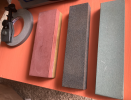- Joined
- Jan 23, 2017
- Messages
- 977
So a site has a sale on Norton waterstones and I'm tempted to try a combo stone.
I have no specific needs here, I'm covered up and down the spectrum. If I get one, it's just to try out the series.
Has anybody used these? Do you feel that stones are better in specific grits and that some are absolute dogs?
The choices are:
220/1000
1000/4000
1000/8000
4000/8000
Thanks for any tips.
I have no specific needs here, I'm covered up and down the spectrum. If I get one, it's just to try out the series.
Has anybody used these? Do you feel that stones are better in specific grits and that some are absolute dogs?
The choices are:
220/1000
1000/4000
1000/8000
4000/8000
Thanks for any tips.




